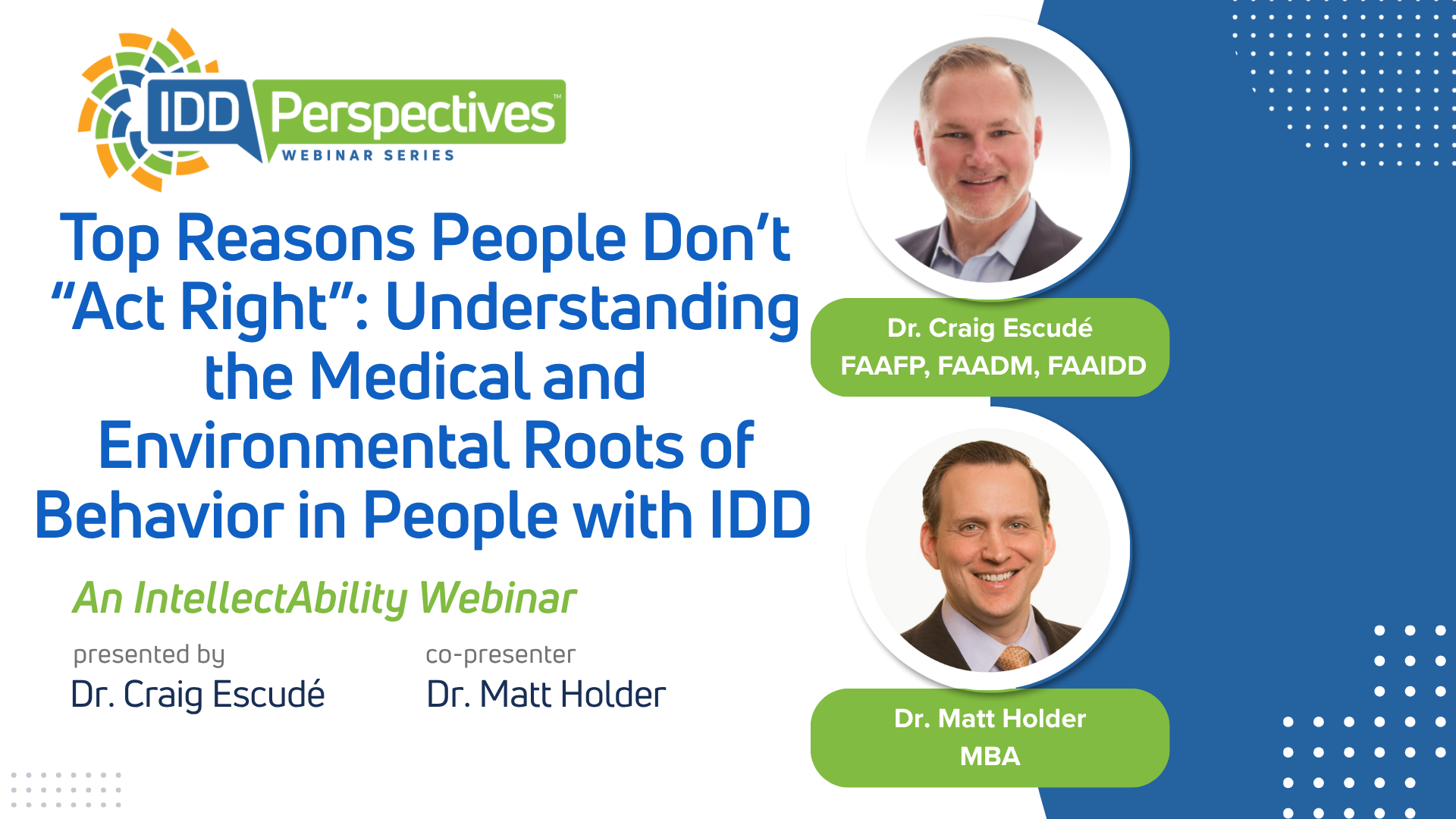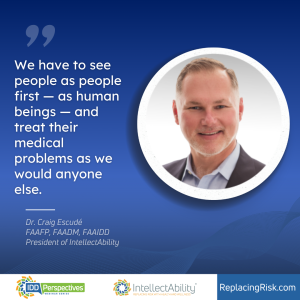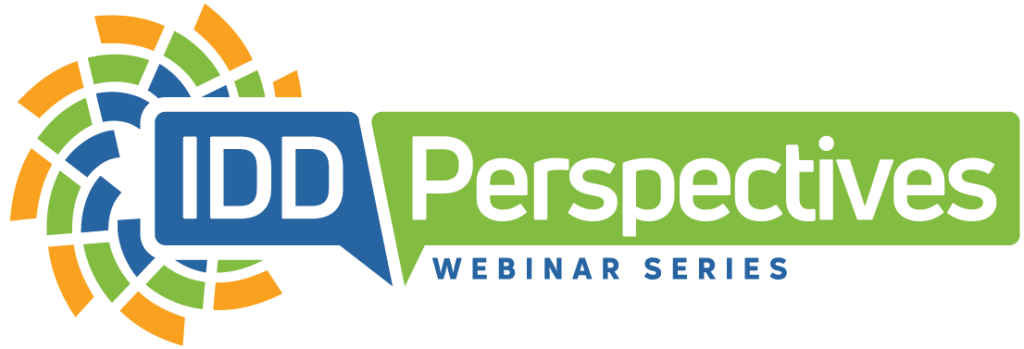
Top Reasons People Don’t “Act Right”: Understanding the Medical and Environmental Roots of Behavior in People with IDD
When an individual with intellectual and developmental disabilities (IDD) begins to act differently — withdrawing, becoming irritable, losing interest in food or daily routines — supporters often describe it simply as, “They’re just not acting right.”
But what does that really mean? And more importantly, what does it tell us?
Behind those few words can lie an entire story: a hidden medical condition, a medication side effect, an illness (such as an infectious disease), a loss, a change in environment, or even something as simple as an earache.
In the most recent IDD Perspectives webinar, Top Reasons People Don’t “Act Right,” hosted by Dr. Craig Escudé, President of IntellectAbility®, and featuring Dr. Matt Holder, a physician and past president of the American Academy of Developmental Medicine and Dentistry (AADMD), the discussion dug deep into the real causes behind behavior change, and how misunderstanding these signs can have serious, even life-threatening consequences. Dr. Holder is also closely involved with the American Association of Intellectual and Developmental Disabilities (AAIDD). This leading organization emphasizes evaluating individuals with intellectual disabilities to identify appropriate supports and services for lifelong community thriving.
Breaking Through the Wall: Advocacy and Persistence in a Complex System
Dr. Holder began the session with a memorable reflection on perseverance and advocacy:
“You just keep hitting your head against the wall until the wall breaks.”
It was a metaphor not for futility, but for persistence — for the kind of determination it takes to make progress in a healthcare system that too often wasn’t built with people with IDD in mind.
The field of IDD medicine requires navigating a level of complexity most clinicians aren’t trained to handle. “Everything we do,” Dr. Holder explained, “is a level of complexity that most people outside the field can’t quite get their mind around.” Too often, systems revert to oversimplified solutions — ones that fail to meet real needs or perpetuate cycles of poor outcomes.
This is especially true, he said, when Medicaid systems push people with IDD into traditional fee-for-service models that don’t reflect the preventive, team-based care they require. “That’s the very system that has continuously failed them,” he noted, “and we have to keep pushing for change.”
When Behavior Is the First Sign of a Medical Problem
As Dr. Escudé recalled from his decades in clinical practice, two phrases repeatedly surfaced when he was asked to see a person with IDD:
- “They’re not eating.”
- “They’re just not acting right.”
Those statements, while vague, were often the first clues that something was medically wrong. Because many people with IDD experience communication challenges, physical pain or discomfort can easily manifest as changes in mood or behavior.
“If I’m hurting and I can’t tell anyone what I’m feeling,” Dr. Escudé said, “
I’m going to find some way to express it.”
Hidden or unrecognized medical issues — like ear infections, constipation, reflux, dental pain, urinary tract infections, or side effects from medication — are among the most common underlying causes of behavioral changes. These issues are often identified only after careful assessment. Multiple factors, such as medical, environmental, and psychological elements, can contribute to changes in behavior.
Dr. Holder shared a particularly striking story: a man in his thirties, labeled “terminal” and placed in Hospice for “failing to thrive,” was found to have a simple, untreated UTI. Once treated, he recovered within days. “They just decided it was time for him to die,” Holder said. “Three days after antibiotics, he perked up — and was fine.”
It was a sobering reminder that what’s perceived as “behavioral” or “end of life” can often be a missed medical condition in disguise.
“See People as People First”
In response to such examples, Dr. Escudé offered one of the webinar’s most resonant reminders:
“We have to see people as people first — as human beings — and treat their medical problems as we would anyone else.”
This person-centered approach is at the heart of IntellectAbility’s mission: helping supporters and clinicians identify health risks that are often missed, and empowering them with the tools and training to replace risk with health and wellness. Recognizing each individual’s unique abilities and needs is essential to providing effective support. A comprehensive approach to care considers the whole person, not just their diagnosis, ensuring that support plans are tailored to the individual’s strengths and preferences.
Polypharmacy: When the “Fix” Becomes the Problem
Many times, a person’s distress or “behavioral” change is met with medication rather than investigation. Both physicians called out the alarming overuse of psychiatric and sedative drugs in the IDD population.
“We missed the thing causing the behavior, treated it with a medicine that has long-term side effects, ignored the side effects, and ten years later, we’re paying huge dollars for something that could have been prevented.” — Dr. Matt Holder
This cycle, prescribing medication to control behavior without identifying its root cause, can lead to polypharmacy, where multiple medications interact and compound side effects. Over time, the result can be over-sedation, movement disorders, aspiration pneumonia, and avoidable hospitalizations.
As Dr. Holder put it, “There’s so much preventable polypharmacy, so many preventable long-term side effects — and it really starts here, with the misinterpretation of behavior.”
Environmental and Social Triggers: When the Context Changes
Not every behavioral shift stems from a medical issue. Environment and social context often play equally important roles. A change in staffing, moving homes, a lost friendship, or even subtle shifts in daily structure can cause significant distress.
Dr. Holder highlighted the transition period between adolescence and adulthood as one of the most fragile times for people with IDD. When young adults “age out” of school systems and structured programs, the sudden loss of support networks can create instability, family burnout, and emotional distress. Community-based programs play a crucial role in providing ongoing assistance and support services, helping individuals remain connected and included within their community. Assistance from these community programs can help individuals navigate transitions and maintain stability during these challenging periods.
“It doesn’t always mean the person has to move out of the house,” he said, “but it does mean we have to help the family restructure their system of support before a crisis happens.”
Even sensory differences, like sensitivity to light, sound, or certain textures, can be powerful behavioral triggers. Dr. Escudé reminded attendees that “we’re all different,” and that both overstimulation and understimulation (boredom, lack of engagement) can cause frustration or attention-seeking behaviors.
Looking for Patterns: The Key to Understanding Behavior
Throughout the conversation, both presenters emphasized the importance of looking for patterns — what happens, when it happens, and what’s happening around it.
“It’s looking at the patterns and the context of behavior that can really help you figure things out.” — Dr. Craig Escudé
Consistent documentation of when behaviors occur and what precedes them can often reveal whether the cause is environmental, sensory, medical, or emotional in nature. Noting changes in adaptive behavior and cognitive functioning can also provide important clues to underlying issues, as shifts in these areas may indicate changes in intellectual or functional status. These patterns often serve as the missing link between confusion and understanding.
Misdiagnosis and the Cost of Overshadowing
Another common trap is diagnostic overshadowing, when behavioral or physical changes are automatically attributed to a person’s disability rather than a treatable condition.
Diagnosing mental health conditions and co-occurring conditions, such as autism spectrum disorder, in individuals with intellectual and developmental disabilities is particularly challenging. The onset and severity of symptoms can make accurate diagnosis difficult, especially when communication barriers exist. Recognizing mental health and neurodevelopmental issues requires careful assessment to avoid misattributing symptoms and to ensure appropriate support.
Dr. Holder cautioned that psychiatric diagnoses like depression, anxiety, or psychosis are often applied prematurely, particularly when communication barriers prevent accurate assessment. He described seeing people discharged from hospitals with diagnoses like ADHD or psychosis despite being nonverbal or medically complex.
“Once you have that diagnosis,” he said, “it explains everything else that goes wrong from now on. That’s something you don’t want to go lightly into.”
The result, he warned, is a “tail-wagging-the-dog” cycle: medications cause new side effects, which are misread as new behaviors, leading to even more medications.
Empowering Families, Direct Supporters, and Clinicians
The final portion of the webinar focused on solutions — specifically, what families and supporters can do when clinicians fail to listen or understand.
Dr. Holder’s advice was direct:
“If your doctor doesn’t listen to you, get a new doctor. Period.”
He explained that most physicians have received little to no training in IDD healthcare and that supporters often know far more about specific syndromes, conditions, or needs than the clinician does.
Dr. Escudé added that when doctors are willing to learn, families should seize the opportunity to collaborate and share resources. It is important to discuss care options with providers to ensure the best possible outcomes.
That’s one reason he wrote Clinical Pearls in IDD Healthcare: to provide families, nurses, and direct support professionals with a physician-written resource they can share with providers to encourage more accurate and compassionate care. Family support plays a critical role in advocating for individuals, coordinating care, and ensuring ongoing evaluation. The goal, he said, is simple: help clinicians “see what they’ve never been taught to see.”
Education, Prevention, and Person-Centered Practice
In closing, both doctors underscored that behaviors are forms of communication, not problems to suppress. Early identification and intervention during childhood are critical for supporting children with intellectual and developmental disabilities (IDD). Eligible children are entitled to special education and related services provided under the Individuals with Disabilities Education Act, which ensures access to appropriate support and inclusion. Through these services, individuals with IDD develop critical adaptive and cognitive skills, ultimately improving their lives throughout their development.
Whether the root cause is pain, frustration, sensory overload, or emotional loss, each behavioral change offers a chance to look closer — not medicate faster.
“Behavior is communication. When a person isn’t acting right, it’s not a problem to fix — it’s a message to understand.” — Dr. Craig Escudé
Key takeaway:
When people with IDD “don’t act right,” our first response shouldn’t be “What’s wrong with them?” but rather, “What are they trying to tell us?”
By slowing down, investigating, and listening — both medically and personally — we can prevent suffering, improve outcomes, and create systems that ultimately serve the people they are intended for.
Explore related resources:
- E-Learning Course: Actions Speak Louder Than Words — Learn to identify the medical causes of behavior change.
- Book: Clinical Pearls in IDD Healthcare — A physician’s guide to improving health outcomes for people with IDD.
- Podcast: IDD Health Matters — Interviews with healthcare leaders, family members, and advocates making a difference in the field.
For more resources, including practical guides and tips on effective healthcare spending in IDD, visit IntellectAbility’s website or explore the complete IDD Perspectives webinar series.





